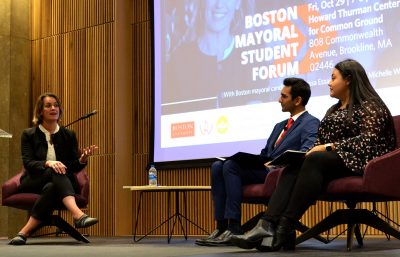
By: Greye Dunn, Isabella Abraham
Mayoral candidates Michelle Wu and Annissa Essaibi George made a final pitch to student voters at a forum at Boston University’s Howard Thurman Center Friday night, discussing concerns regarding affordable housing, environmental policy and the ongoing opioid epidemic.
BU Student Government hosted the event along with the Boston Intercollegiate Government — a student-led governance organization that represents a coalition of local colleges. The Howard Thurman Center for Common Ground and the BU Initiative on Cities — an urban related research hub — also provided support for the forum.
Around 122 BU students, 30 Boston-area college students and 25 BIG school representatives attended the forum in person.
Gabriela Ramirez, CAS StuGov deputy director of city affairs and a College of Arts and Sciences junior, and Hessann Farooqi, BU student body vice president and CAS senior, moderated the event.
Candidates fielded student-submitted questions regarding gentrification in areas like Allston, climate change on the waterfront, supporting small businesses, addiction and other topics.
Essaibi George took the stage for the first 30 minutes. On combating gentrification, she emphasized investing in public housing, creating opportunities for rental affordability and working with universities to create more on-campus housing.
“I’m grateful that students, college students in particular, are concerned about the cost of housing here in the city of Boston, and the pressures that puts on so many of our city’s residents, our city’s families and our older residents,” Essaibi George said.
She also spoke about funding small business owners of color, who make up less than 1% of city contracts.
“We’ve got to do more to support, to invest in and help them not just rebuild after COVID, but think about what opportunities are in the future,” she said.
City efforts to increase climate resiliency — especially at the waterfront — require federal and state coordination, Essaibi George said, and should center the most vulnerable communities.
“As mayor, I will bring that conversation into our neighborhoods, into our communities,” she said.
Essaibi George said she would work with leading organizations to encourage unhoused individuals and individuals experiencing addiction to enter longer-term supportive care and housing on day one of her administration.
“The crisis is seriously at a tipping point,” she said. “We are seeing our continuum of care here in Boston collapsing under the weight, the burden of this crisis.”
Next to take the stage was Wu, who answered her first student question about her ideal vision for using American Rescue Plan funding in the city: closing the racial wealth gap, among other changes.
Wu said the opportunity to use the funds for these purposes cannot be understated due to rising housing prices that are pushing out Black and brown families.
“I’ve been the only candidate in support of rent stabilization, fighting for not just boosting the supply of housing, but ensuring we’re taking action for emergency relief to keep families in their homes right now,” she said.
Small businesses would also see external funding to combat the lack of representation for the diversity of communities in Boston, Wu said.
“I know how hard our small business owners work,” she said. “I know what a difference it makes for neighborhoods when there are thriving businesses and I’ve seen how devastated our businesses have been during the pandemic.”
On the question of creating a more resilient waterfront, Wu pushed her plan for a Green New Deal in Boston, which she said would be a solution to the City’s lack of “big picture planning.”
She added that when addressing climate change, investing money up front in free T rides would save the City more in the long run.
“We need to zoom out and be planning for not just a year from now, but five, 10, 50, 100 years from now,” Wu said.
Wu said she would address the crisis of homelessness, substance abuse and mental illness from the “root causes,” promising to retrofit supportive housing and assign a physician who reports directly to the mayor on the issue.
“Immediately, I’m going to make sure that there’s leadership and accountability,” she said.
Farooqi said in an interview he enjoyed hearing about both candidates’ experiences in college.
“I thought it was a huge success,” Farooqi said.
Co-editor of the Boston Political Review and CAS Senior Justin Dynia attended the mayoral forum. Hesaid he’d like to see long-term planning from the start of the future mayor’s administration, whether in housing, climate and education policy.
“I want to see a mayor’s cohesive vision for the city in the future, ” Dynia said. “I want to see that they have a sustainable plan that touches a lot of the aspects that are important to Boston.”
At the forum, low student voter turnout was brought up. Dynia said voter apathy in local elections could be attributed to the lack of “exciting” local issues.
He added that local politics is where “the nitty gritty of public policy is made” and that he hopes students will change their mindsets about voting.
“I think it’s really important for students to use their voices,” Dynia said. “Boston is America’s largest college town. … So, it is really important for students to get to the polls and make their voices heard.”
The Boston mayoral general election is Nov. 2.




























































































































